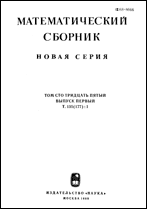|
An algebraic study of the simplest codes and coefficientless equations in words
L. G. Kiseleva
Abstract:
Let $A=\{a_1,\dots,a_n\}$ be an alphabet and let $W=\{w_1,\dots,w_m\}$ be an $m$-code, i.e. a set consisting of $m$ words in the alphabet $A$; let $|\alpha|$ denote the length of a word $\alpha$. Suppose that $\Sigma(W)=\sum_{i=1}^m|w_i|$, that $B=\{b_1,\dots,b_m\}$ is the alphabet of the message language, and $A^+=\bigcup_{i=1}^\infty A^i$, $f=f_W\colon B^+\to A^+$, $f(b_i)=w_i$, $f(\alpha\beta)=f(\alpha)f(\beta)$ is an alphabetic encoding,
\begin{gather*}
R(W)=\{\langle\mu,\nu\rangle\mid f(\mu)\equiv f(\nu),\mu\not\equiv\nu\},\\
X'(W)=\min\{|\alpha|:\langle\mu,\nu\rangle\in R(W),f(\mu)\equiv f(\nu)\equiv\alpha\},\\
X'(m,N)=\max\{X'(W):\vert W\vert=m,\Sigma(W)\leqslant N\}.
\end{gather*}
$X'(m,N)$ characterizes the smallest number of comparisons which are needed to solve the problem of $f_W$ being one-to-one for the $m$-code $W$ in the worst case when the size of the input information $\Sigma(W)\leqslant N$ (the unit of measurement is a comparison of letters from $A$). It is proved that $X'(3,N)\sim N^2/8$. We show that a nonhomogeneous equation in words in three unknowns has at most one nontrivial solution, up to isomorphism.
Bibliography: 10 titles.
Received: 13.04.1977
Citation:
L. G. Kiseleva, “An algebraic study of the simplest codes and coefficientless equations in words”, Math. USSR-Sb., 36:4 (1980), 495–517
Linking options:
https://www.mathnet.ru/eng/sm2319https://doi.org/10.1070/SM1980v036n04ABEH001853 https://www.mathnet.ru/eng/sm/v150/i4/p529
|


|




 Contact us:
Contact us: Terms of Use
Terms of Use
 Registration to the website
Registration to the website Logotypes
Logotypes








 Citation in format
Citation in format 